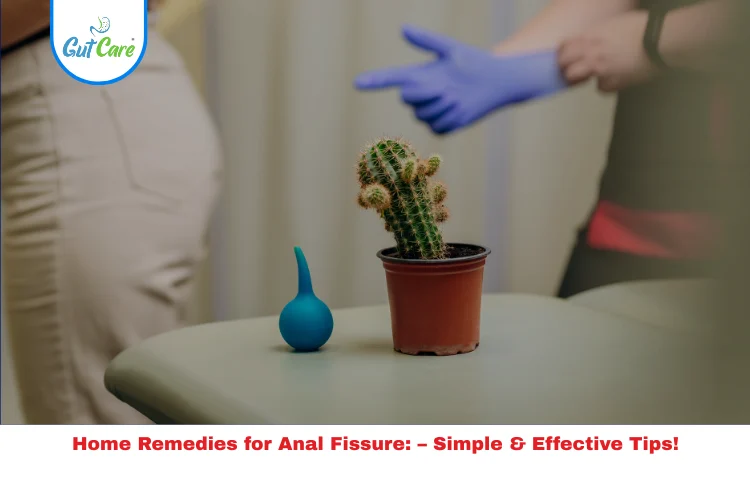Anal fissures can be uncomfortable and often painful, which has an impact on quality of life. Anal fissures may also be caused by chronic constipation, passing hard stools or excessive straining during bowel movements. Whatever the cause of the anal fissure, they can usually be managed with home remedies when it is in the early stages.
At Gut Care Clinics Bangalore, we understand how important it is to provide safe, effective, and accessible guidance. This post explores the best home remedies for anal fissure relief, helping you understand how to ease discomfort and encourage healing from the comfort of your home.
What Is an Anal Fissure?
An anal fissure is a small tear in the lining of the anus. Fissures can cause pain, bleeding and discomfort, especially during or after a bowel movement. Students commonly conflate hemorrhoids and fissures, when in fact these are different conditions. Hemorrhoids are swollen veins in the anal canal while fissures are tears in the skin. Understanding the difference between piles and fissures can assist in selecting the best treatment avenue.
Common Signs and Symptoms
Before diving into the remedies, it’s helpful to recognize the symptoms:
- Sharp pain during or after bowel movements
- Visible tear or crack near the anus
- Bright red blood on toilet paper or in the stool
- Itching or irritation in the anal area
Recognizing the signs a fissure is healing—like reduced pain, less bleeding, and shrinking of the tear—is important to track your progress.
Top Home Remedies for Anal Fissure Relief
Below are some of the best anal fissure treatment at home tip provided by GutCare Bangalore experts:
1. Sitz Bath for Anal Fissure Relief
A sitz bath for fissure would be one of the most comforting and recommended treatments.
How to use:
- Fill a wash basin or tub with warm (not hot) water.
- Soak your anal area for 15-20 minutes, 2-3 times a day, and importantly after bowel movement.
Benefits:
- Relaxes the anal muscles
- Improves blood flow, aiding healing
- Provides immediate relief from pain and itching
Precautions:
- Make sure the water is clean to prevent infections.
- Dry the area gently after soaking.
2. Increase Fiber Intake
Diet plays a crucial role in managing fissures. A high-fiber diet helps soften stools, reducing strain during bowel movements.
What to Include:
- Fresh fruits (papaya, apples, bananas)
- Vegetables (broccoli, spinach, carrots)
- Whole grains, legumes, flaxseeds
Benefits:
- Prevents constipation
- Promotes smooth bowel movements
Tip: You can also consider natural fiber supplements like psyllium husk if dietary changes aren’t sufficient.
3. Stay Hydrated
Drinking plenty of water is essential for digestive health and preventing hard stools, a major trigger for fissures.
Recommended Intake:
- At least 8–10 glasses of water per day
Benefits:
- Keeps stools soft and easy to pass
- Aids in overall healing
Precautions: Limit caffeine and alcohol, which can cause dehydration and worsen symptoms.
4. Use Coconut Oil or Aloe Vera
Natural topical remedies like coconut oil and aloe vera can soothe and protect the area.
How to Apply:
- Clean the anal area gently with water.
- Apply a small amount of virgin coconut oil or fresh aloe vera gel using clean hands or cotton.
Benefits:
- Anti-inflammatory and antibacterial properties
- Reduces pain, swelling, and promotes healing
Precautions: Always do a patch test to rule out allergies or irritation.
5. Apply Warm Compresses
Using a warm compress can help improve circulation and relieve tightness around the anal muscles.
How to Use:
- Soak a clean cloth in warm water and apply to the affected area for 10–15 minutes.
Benefits:
- Encourages blood flow
- Reduces muscle spasms and pain
6. Avoid Straining During Bowel Movements
Straining can worsen fissures or slow down the healing process.
Tips:
- Go to the toilet as soon as you feel the urge.
- Use a footstool to elevate your legs and ease the passage.
- Avoid sitting on the toilet for too long.
Precaution: If constipation is chronic, consult a doctor for a laxative recommendation.
7. Use Natural Stool Softeners
If dietary fiber isn’t enough, natural stool softeners can be used temporarily.
Options Include:
- Prune juice
- Castor oil (in moderation)
- Magnesium supplements
Important: Always consult a healthcare provider before starting supplements, especially if you’re on other medications.
When to See an Anal Fissure Specialist
While these home remedies for anal fissure provide relief in many cases, it’s important to consult a medical professional in the following situations:
- Symptoms persist for more than 6 weeks (chronic fissure)
- Severe bleeding or pain
- Signs of infection (swelling, pus, fever)
- No signs of healing despite home treatment
At GutCare Bangalore, our experienced anal fissure specialists provide advanced care options, including non-surgical and minimally invasive procedures when needed. If you’re unsure whether it’s a fissure or piles, a proper diagnosis is key.
Signs a Fissure Is Healing
You’re likely on the right track if you notice:
- Less pain during bowel movements
- Reduced bleeding
- Itching instead of sharp pain (a sign of skin recovery)
- The tear appears smaller
If these signs are absent after 1–2 weeks of care, consult a specialist.
Final Thoughts
Managing anal fissures at home is possible with the right approach. Here’s a quick recap of effective anal fissure treatment at home options:
- Take regular sitz baths for fissure relief
- Eat a fiber-rich diet and stay hydrated
- Use natural remedies like coconut oil and aloe vera
- Avoid straining during bowel movements
- Consider mild stool softeners if necessary
While these home remedies offer significant relief, chronic or severe cases require expert attention. Don’t ignore persistent symptoms—consult an anal fissure specialist at GutCare Bangalore for accurate diagnosis and advanced treatment options.
Your health matters—start healing today.
FAQs
1. What are the best home remedies for anal fissure relief?
The best home remedies for anal fissure include taking a sitz bath for fissure relief, eating a high-fiber diet, staying hydrated, applying coconut oil or aloe vera, and avoiding straining during bowel movements. These methods help reduce pain and promote natural healing.
2. Can I manage anal fissure treatment at home without visiting a doctor?
Yes, anal fissure treatment at home is possible for mild cases using natural remedies like warm baths, fiber intake, and stool softeners. However, if symptoms persist beyond a few weeks, it’s important to consult an anal fissure specialist for proper evaluation.
3. How can I tell the difference between piles and fissures?
The difference between piles and fissures lies in the symptoms: piles (hemorrhoids) are swollen blood vessels that may bleed without much pain, while fissures are painful tears in the anal lining, often with bleeding and sharp pain during bowel movements.
4. Are hemorrhoids and fissures related conditions?
Yes, hemorrhoids and fissures often share similar triggers like constipation and straining, but they are different conditions. Treating the underlying causes such as diet and hygiene can help manage both effectively.
5. What are the signs a fissure is healing?
Signs a fissure is healing include reduced pain, less bleeding during bowel movements, minimal itching, and the visual shrinking of the tear. Consistent use of home remedies for anal fissure can speed up recovery if symptoms are mild.




